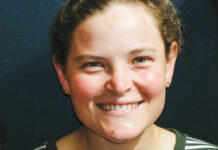
Rabbi Joanne Yocheved Heiligman went through two college majors, psychology and engineering, and then worked in software development. But, she said, “none of it stuck.”
Heiligman, the new spiritual leader of Columbia’s Bet Chaverim Congregation, said that she kept coming back to the idea of becoming a rabbi.
The non-Orthodox movements now wholeheartedly accept women as rabbis. But in 1982, things were different. When Heiligman first applied to the Conservative movement’s Jewish Theological Seminary, she was told ordination was not a guarantee. “That wasn’t very reasonable,” Heiligman said. (JTS didn’t ordain its first woman rabbi until 1985.) She was also told she couldn’t be ordained as a Reform rabbi because she wasn’t Reform. “That was fair,” she said.
So, at 27, she entered the Reconstructionist Rabbinical College.
“I became a rabbi because I love Judaism,” said Heiligman, 66, of Columbia. “Some people become rabbis because they want to promote their activism or change Judaism. That wasn’t my reason.”
Her upbringing in Squirrel Hill, a neighborhood in Pittsburgh with a large Jewish community, inspired her to become a rabbi.
She remembered how, when she was 3, a next-door neighbor taught their children the blessings for different foods. Heiligman recalled feeling deprived, she said.
“I remember in first grade begging to go to Hebrew school,” she said. Her Hebrew school didn’t begin until the third grade, but she prevailed in second grade.
Heiligman’s mother was an agnostic, who never forgave God for the Holocaust.
“My mother also said she didn’t want to raise ignorant children,” Heiligman recalled. “She wanted us to know who we were, and we should have a Jewish education and decide for ourselves where we went from there.
“It was by no means an Orthodox home, but it was definitely strongly Jewish identified,” she added.
When she was in high school and college, Heiligman taught at Hebrew school.
After her ordination, she took on five positions in Conservative, Reform and independent communities in a career that spanned 38 years.
She retired in 2018 after 17 years with Columbia’s Congregation Shalom Aleichem, an independent synagogue that has since folded.
“The people were fantastic, lovely people, but we never had a building,” Heiligman said of Shalom Aleichem. “We had books, but any time we had a service, we had to schlep things, then take it all down after the service. There was a critical energy mass that we had for some years, but we didn’t have it by the end.”
During her years of retirement, she devoted herself to making Torah-inspired quilts and multimedia art, which she has created all her life.
Then in April of this year, she received a call from Bet Chaverim, a Conservative congregation in Columbia.
Bet Chaverim offered her the opportunity to serve as their rabbi. She accepted and started in July.
So far, she is pleased that the congregants are so religiously engaged.
“I’ll be teaching, and they’ll be teaching me at the same time,” she said. “There are some very learned members, and that’s exciting. And I’m not the only one who bakes challah for Shabbat.”
She said she has plans for programs and initiatives that will foster a sense of community and spiritual growth. In the coming year, she hopes to have more in-depth study of the Tanach for the congregation. She wants to find ways to connect the newer, younger members who have children with the older members who founded the congregation in 2013.
Heiligman and her husband, Gary, an astrophysicist, are committed to opening their home to the community as well. She plans to have congregants over to her house for Shabbat dinner on weeks she is not officiating.
Heiligman is also passionate about several different social justice issues and causes.
“Right now, near the top of my agenda is food insecurity right here in our own backyard,” she said. “I read in the Baltimore Jewish Times that over a third of the Jews in the area don’t have enough money to get through the next three months. I’m also concerned about health care.”
She intends to speak about these issues from the pulpit.
“Being part of a congregation is an opportunity to amplify both our voice and our mitzvot, and that broadens even further when you go beyond the walls of the synagogue to join with a congregation or another church,” Heiligman said. “There are so many different things the congregation can work on and make a difference together.”







